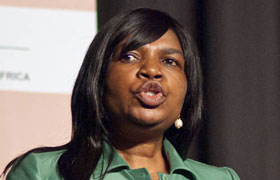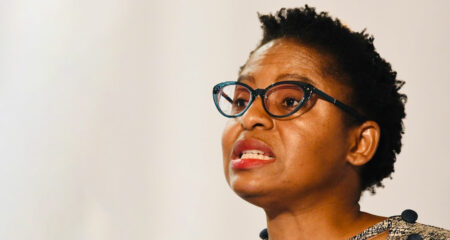
The failure by communications minister Dina Pule to make the ANC’s national executive committee last month shouldn’t be considered a bad omen for her future, political analysts have told TechCentral.
Pule failed to secure sufficient votes at the ANC’s elective congress in Mangaung in the Free State in December to retain her position on the NEC, despite being voted in at 38th on the list at the elective conference in Polokwane in 2007.
Analysts suggest her fall off the NEC shouldn’t affect her ability to pursue the aims of her department and won’t necessarily affect her position in government. They say that the controversy that dogged Pule in 2012 may in part explain why she failed to make the cut for a spot on the NEC. But they say one shouldn’t read too much into the fact that she did not secure election to the executive committee.
Analyst Sipho Seepe says not making it onto the NEC is not always a reflection of an individual’s standing in the party. The chief whip in parliament didn’t make the cut, and neither did a number of former ministers, some of whom have considerable influence, he says. “We’ve had other ministers who served in cabinet who were never members of the NEC.
“One must also understand that the ANC is a political party with 1,2m members in good standing, but that there are only so many spaces on the NEC,” Seepe adds. “Perhaps [Pule] failed to be part of a big enough lobbying group, or perhaps there were too many other suitable candidates.”
Seepe says that the only potential problem for Pule is that by not being on the NEC, she may not be part of the most important debates that inform government policy. However, he adds that ANC branches remain the real drivers when it comes to pushing departmental aims and Pule may remain influential at branch level.
“The NEC is informed by the branches,” Seepe says. “The question to ask is whether [Pule] is making herself available to those debates. Let’s not romanticise the privileges that come from being on the NEC. Some people are always considered the real thinkers and the real speakers [and] others aren’t, irrespective of whether they’re NEC members or not.”
Analyst Steven Friedman also downplays the significance of Pule missing out on a spot on the NEC. “It’s not especially worrying,” he says. “A cabinet minister doesn’t have to be a member of the NEC. Some of them, like Trevor Manuel, even opted out of it.”
Friedman says there were 254 candidates for a mere 80 NEC positions, so competition was fierce. Rather than Pule’s failure to secure a position on the NEC portending trouble ahead for the minister, Friedman suggests it may, in fact, merely demonstrate that “Pule has never been a cabinet or ANC heavyweight”.
It may be that the minister isn’t so much being pushed out as overlooked. “In a highly competitive NEC race, it’s difficult for middle-ranked figures to get in,” Friedman says. In electing the NEC, factions often get together and engage in “slate voting” where they pick candidates to support collectively.
Pule may have failed to lobby these groups successfully, or “it’s possible concerns about her personal spending habits may have alienated people”.
“But you can’t assume her time in cabinet is finished just because she didn’t make it onto the NEC”.
Pule spent much of 2012 embroiled in controversy after reports that her supposed romantic interest, Phosane Mngqibisa, allegedly misused sponsors’ funds earmarked for the ICT Indaba in Cape Town, sparking an investigation by the public protector. — (c) 2013 NewsCentral Media




